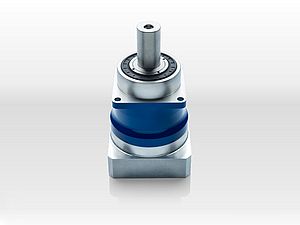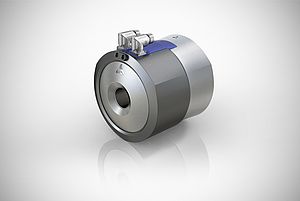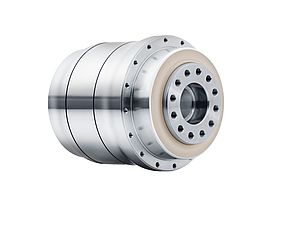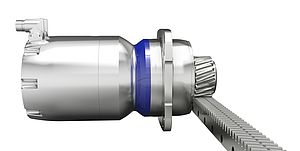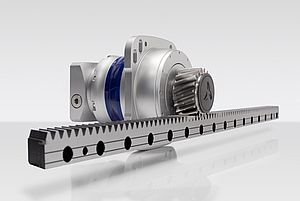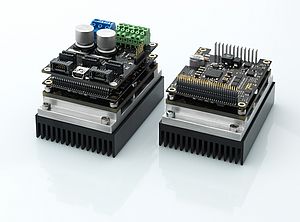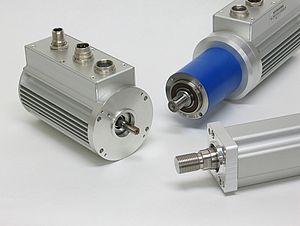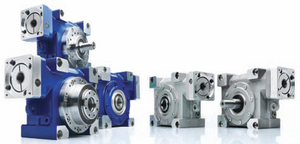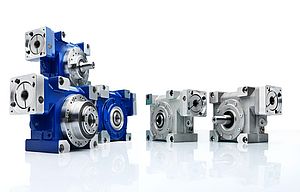TPM stands for superior power density and maximum dynamic response. Goalie ''Robokeeper'' demonstrates the unbeatable professional performance that rotary actuators offer robotics.Imagine the following situation: as manager of a football team, you are lucky enough to be able call up a goalkeeper who not only saves almost any penalty on the line but never loses his cool or utters a critical word. Wouldn't that be a fantastic position to be in? Believe it or not, this perfect goalkeeper really does exist! And his inimitable reliability and speed are thanks to Wittenstein alpha technology. Robo- Keeper is a highly acclaimed sports personality. RoboKeeper's virtual invincibility - and his formidable reputation as the world's best penalty killer - is attributable in no small part to the TPM+ drive concept.
The 6'5'' tall RoboKeeper has none of the airs and graces of his star colleagues and never gives anything less than his all in the game. He dives into the far corner of the goal in just 0.3 seconds and holds balls coming at him at speeds of up to 65 mph. He has already demonstrated his speed at numerous footballn matches, sports fairs and events.
He made his debut in 2007, in the course of a nine-day event at the Ideas Expo in Hanover, the ''ace keeper'' - who measures six foot five from his fingertips to his toes - faced a total of 8000 would-be scorers,. Out of 10,000 shots at goal, RoboKeeper let in just 500. Fast and precise thanks to TPM+ and engineering support this unprecedentedly fast and precise goalkeeper was developed and built by the Fraunhofer Institute for Material Flow and Logistics (IML) in Germany.
The research team was advised and supported regarding the engineering for the complete drive unit by alpha engineers and experienced solution architects at Wittenstein motion control. They steered the drive to maximum dynamic performance by optimising the traverse profiles and the parameter settings in the field. Motor/gearhead combination is the key - RoboKeeper is basically an outsized Tipp-Kick figure mounted on a gearhead/motor combination. Above the goal are two cameras that recognise the ball and follow its trajectory. Using this data, the image processing software calculates the ball's probable point of entry into the goal. It sends this information to the motor control, which turns the goalkeeper to the angle required to save the shot.
All this takes place in a fraction of a second - if the penalty shooter kicks the ball hard, it can easily reach a speed of 65 mph, equivalent to about a hundred feet a second. It covers the 36 feet to the centre of the goal in just 0.4 seconds and needs only marginally longer (0.42 seconds) to complete the 38 feet to either of the top corners. RoboKeeper's working conditions are even more difficult than usual, however, because the distance between the penalty spot and the goal is no more than two or three yards, depending where he is standing.
These figures clearly illustrate the dynamic requirements of the system - including the servo actuator, which Wittenstein had to meet. A mere 0.3 seconds are all that is available to move the fifteen-pound goalkeeper, comprised of a foam body and an aluminium spine, into the right position.
Wittenstein was the only supplier capable of delivering the motor/gearhead combination (TPM+ 110 with a ratio of 61) necessary to turn RoboKeeper into a true ''penalty killer''. The performance displayed by the image processing computer is no less impressive: each of the two cameras takes a staggering 60 photographs a second. Five images, which the software evaluates in a tenth of a second, are needed to calculate the ball's trajectory. The motor starts to turn just 50 milliseconds (0.05 seconds) after the kick has been delivered. It reaches its final speed (33 mph at the fingertips) 0.07 seconds later. This acceleration is 17 times faster than that of a Formula One racing car. The time to brake the motor from maximum speed to standstill is exactly the same, namely 70 milliseconds.
All in all, the robot is 15 milliseconds faster than the ball. Put another way, RoboKeeper is ready and waiting when the ball is still 45 cm away from the goal line. With this kind of reaction speed, he would have no trouble saving penalty shots in the Premiership. In Germany, RoboKeeper challenged the German Bundesliga star, Dédé and irrefutably proved RoboKeeper's enormous talent, the Brazilian professional who plays for Borussia Dortmund could not beat our man. RTL documented this exciting challenge on national German TV - interested customers are welcome to ask their local alpha sales engineer for a copy of the video. To stand a chance of beating the robot, the ball must either cross the line spot on in one of the top corners or approach it at a speed of more than 65 mph - neither of which happens that often.
It took almost two years to develop RoboKeeper, the idea for which was originally conceived during the last World Cup. ''Research meets entertainment'' was the motto of the development team, led by Fraunhofer IML Director Prof. Michael ten Hompel. Their efforts have meanwhile been rewarded by numerous enquiries from journalists and a packed diary for the new keeper.




